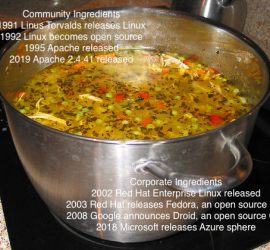Earlier, I posted my translated excerpt of the paper linked below. The link leads to the IFLA site, which now has the original paper, along with the official English translation in its entirety. VERA LOBOS, Felipe and LAGOS LAGOS, Hernán (2019) Decentralizing Latin American library infrastructure: Testing and pilot implementation of a decentralized library lending system based on credentials of sovereign and interchangeable users built with Blockchain technology. […]
Blockchain
For libraries, Blockchain represents the opportunity to build their own networks. Beyond being independent of such entities as OCLC, libraries will be able to redefine relationships with patrons. The lessons of the past show how this opportunity can either define the future or be passed by. Here are the three main lessons from the past of Bibframe, Word and Linux. Agreement to act is necessary. Bibframe […]
This could also be viewed as a MARC (MAchine Readable Cataloging) timeline. The story of why MARC continues and why Bibframe failed illustrates that it is not enough for something to be better or even for everyone to agree that the old solution has outlived its usefulness. There also has to be an agreement, either from the top or bottom, to use the new solution. Photo […]
What do you say to a champion? Few in the family knew. At large gatherings, Horacio Velha (lower left on the poster) often stood alone or with his wife, occasionally talking to others from the immigrant generation. By then he was elderly, but he always stood straight and wore a suit. He wore green, even when the color was out of favor. It made for an […]
Le Central in San Francisco has kept the same stew going for over 40 years. A perpetual stew or soup is something from the era before refrigeration, constantly kept warm, never completely emptied and with new ingredients added to fill the pot. So it is with the Linux kernel. It was released in 1991. Since then, there has always been something new. It mixes with the old […]
Most of what we have written about concerns new peer-to-peer paradigms, which are inspired by blockchain and BTC (Bitcoin). If financial networks can be peer-to-peer, what about other things? Now it’s time to look in the other direction. Is blockchain supporting old paradigms? It is. In terms of how things worked a couple of industrial revolutions ago, it’s a tool like a wrench. A wrench can […]
On July 16, 2018, Felipe Vera posted a short but important paper, in which he showed how Blockchain would make the leap from the financial world to the rest of the world. My translation of two key paragraphs follows: Value transfer is already a reality and has its intrinsic foundations in the first and most well-known cryptocurrency called Bitcoin. This technology was conceived in the year […]
So far, all libraries that we know of using Blockchain are in Chile, and their systems were put in place by Prodigio Consultores. Here is what’s listed on their website as of 9/11/19 Proyectos en ejecución- Projects in process Biblioteca Digital SUBDERE– Subsecretariat of Regional Development Digital Archive Repositorio Digital SERNAGEOMIN (Servicio Nacional de Geología y Minería)- National Geology and Mining Service Digital Archive Sistema de Biblioteca, Univ Católica de Temuco,- Catholic Univ of Temuco Library […]
Right now there are several Chilean libraries checking out materials to users with universal sovereign identities based in Blockchain technology. The authors below at Prodigio Consultores have working systems up and running. Their paper on the subject was just given at IFLA WLIC (International Federation of Library Associations World Library and Information Congress) this year and was submitted on May 27. Future posts will look at […]
Satoshi Nakamoto outlined the basis of Blockchain and subsequently bitcoin with the above quote in his 2008 paper. The paper also anticipated the 51% attack: “If a greedy attacker is able to assemble more CPU power than all the honest nodes, he would have to choose between using it to defraud people by stealing back his payments, or using it to generate new coins. He ought […]
How do we approach Blockchain in libraries as developers? We can start small and replicate a function that is not done with Blockchain. A demo or even a novelty would be good. In Raymond Dean’s web design class, we were assigned to put in various types of code such as JavaScript, along with our usual CSS and HTML5. My goal is still to make it to […]
This article by Marco Iansiti and Karim R. Lakhani came out in the January/February issue of the Harvard Business Review. The authors outline an adaptation cycle for Blockchain, which they predict will closely follow the trajectory of TCP/IP adaptation. TCP/IP began as a single use application for ARPAnet messaging. Before that, computers had to be connected to each other in order to communicate. From there, they […]


